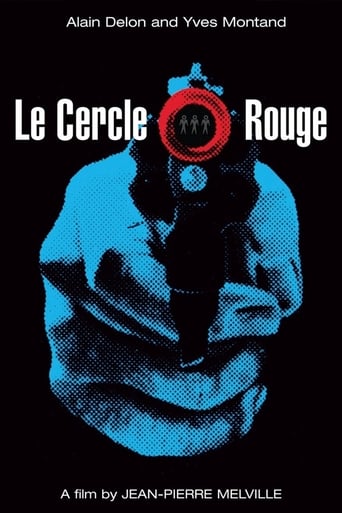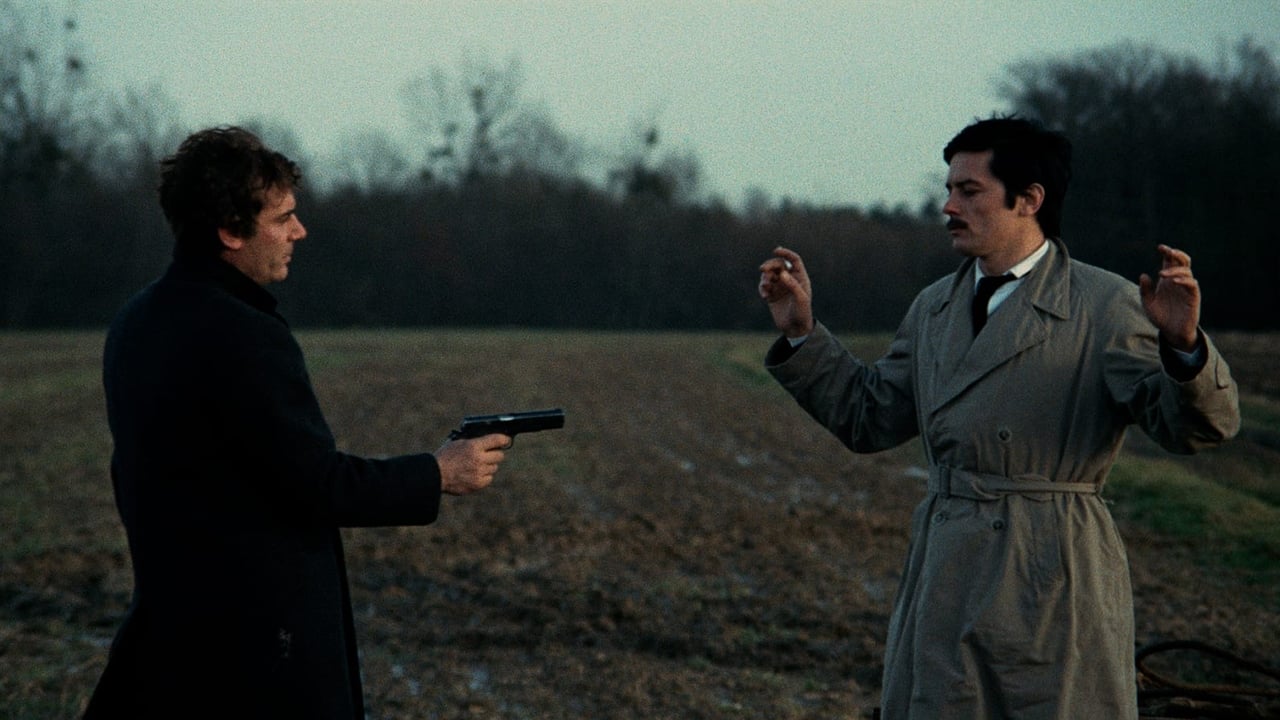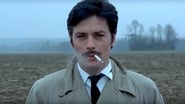Barbouzes
Melville is overrated. The story in Le Circle Rouge is actually well put together (and features a fine brochette of well-known actors of the era) but it still feels like the work of a one-track-mind guy who believes guys are guys, and only guys know about life - how hard and how full it is. (The women in Melville's scripts never amount to much. In this movie, they are either mute cabaret dancers, child-like bunny waitresses who stand as background with nothing to do, and 1 lying cheating two timing Lilith- and of course that one is completely naked the only time we see her, and for no real good reason. Need I say: not one of these women gets more than 1 speaking line, when they do get to speak. Melville, your auteur vision is called Misogyny.) The heist is suspenseful, some plot twists are well introduced, 2 or 3 scenes stand out, but all in all, it feels too long, and very artificial (Yo, Melville, dude, what 's up with the 60s American cars featured in ALL your films? Hello, how many of these cars really ran around Paris in 1970?! And how discreet they must have been as gangsters getaway cars....!) It is preciously noir and dead serious, but in the end it is shallow. I'd give 4 Melvilles for 1 B-movie with Bogart and true heft in it.
JLRVancouver
Le Cercle Rouge is a top drawer French gangster film directed by Jean-Pierre Melville and staring Alain Delon, Andre Bourvil, Gian Maria Volontè and Yves Montand. The movie is a classic 'heist picture', precisely and methodically moving through the set-up, the recruiting, the job, the escape and the bloody aftermath. The acting is excellent (although often minimalist) with Volontè (likely best known to most North Americans as the evil brother Ramon in "Fistful of Dollars" and the sadistic El Indio in "for a Few Dollars More) a real standout. A must-see for anyone who likes their cold-blooded killers snappily dressed in trench coats and fedoras.
ElMaruecan82
What a waste! As I was watching Melville's "Red Circle", I couldn't help but think of life's cruelty. One of the greatest comedic French actors had just started to show how naturally equipped he was for drama, his name was Bourvil but he made a first name out of his breakthrough performance, André, as to distance himself from the lovable buffoon teaming up with De Funès. And yes, André Bourvil as Detective Mattei was mesmerizing without trying, his range of emotions is mostly composed of reactions and the conviction that no matter how hopeless the case is, he must move forward.And it's a waste that such a great actor had to leave the world just when we had a glimpse of his real talent, when he could have ruled French cinema for one decade or two. No, "The Red Circle" was his swan song, a final farewell to the screen he graced for thirty years. Cancer was already devouring him while he was making the film, but just as if he were impregnated by the toughness and stubbornness of his character, he kept going. And maybe that's what manhood is about, moving forward and acting according to his nature. And I think if there ever is a lesson Melville movies could teach us, is this idea of virility not as a synonym of toughness, strength, or a way with women (women have actually very secondary importance in his film) but tenacity, loyalty and principles.All the men that populate Melville's "Red Circle" are driven by a code, not exactly a code of honor, but close enough. Melville would have never dared to entrust his stories to lowlife criminals, he despised criminals with all his heart but acknowledged that gangsters were the best vehicle to values such as loyalty, duty, friendship, that Cinema made appealing. Two years later, a certain movie made by Francis Ford Coppola would prove him right, and Coppola would also suffer from the claim that he romanticized gangsters. Melville's gangsters are men who have been put in the wrong path and following their existential road, can't turn the clock back and have no other choice than trying to put within their dishonest racket, some bits of honor. You know you're not in the right side of the law, but you never try to betray your own codes, fair trade.And this is why the gangsters only kill when they're threatened, why they let the security guard alive during the heist, causing him to set the alarm, this is why the day before, when Vogel (Gian Maria Volonte) who just slipped away from Mattei, hides in the car driven by freshly released Corey (Alain Delon), he doesn't know that Corey saw him and let him do so. When the two men confront each other, a few lines are said and they're barely audible, the essential is in the eyes, the men know they can trust each other, and later, it pays off, when Vogel saves Corey from a tricky situation. What goes between these two recluse, taciturn men is the telepathic understanding that some things are better left unspoken, except the essential: the heist, in men's words: business, action.Melville made "Bob le Flambeur", one of the seminal caper films, but never has a heist looked so fluidly easy and fascinating to watch. There's not one single shot wasted, from the preparation to the execution, everything is perfectly oiled, and I loved the interpretation of Montand as Jansen, a former cop and sharpshooter, they needed one to deactivate the alarm from a thirty meters distance. And Melville is like the God-like manipulator of these figures; his voice sets the tone with a quotation of Buddha about a red circle, a sort of symbolic place where men with a 'history' together end up confronting each other. The line was made up, as it's always the case with Melville, but it serves a purpose, to leave us disillusioned about the heist, this is not what the film is about.We know it's doomed, and it's a masterstroke not to have added some artificial romance as the obligatory 'human factor'
what leads the men to their downfall is just a chain of events implicating Mattei, Corey's former partner (and obvious traitor) and Jean-Pierre Périer as a man with his feet on the two sides. The mechanisms are all set-up from the start and at the end, we're just accepting the facts with resignation, Corey and Vogel had it coming but somewhat, we don't think they deserved it, and the last line coming from Jansen about the Police is ambiguous but gives a hint about his 'personal' motives. Sometimes, it's not just business. All men have history and it's the record they try to settle that drive their actions. Again, that was two years before Coppola.One of the most memorable lines of the film (given the film's overall quietness, any powerful line was a high spot) was: "every man is guilty, we're born innocent but it never lasts", says the Chief of Police to Mattei in the beginning and the end, Mattei walks away repeating "all guilty", everyone is part of the same game, it's all about deception and betrayal, crooks playing fair, cops cheating, and that's the only way to make these two worlds meet, and this is why there's always one raison to root for all the characters, not enough to make the endings sad, only realistic albeit cynical. That's what this smiling Buddha in the opening title seems to express: cynicism, disillusion, whatever you build will be wasted.And what a waste that these men lost after all these efforts but more importantly that André Bourvil died so shortly after the film, and that a director of Melville's caliber would die 3 years later after his second feature film with Delon "Un Flic". When real life is cruel, you'll find more relief in Melville's films.
Artimidor Federkiel
Jean-Pierre Melville doesn't need a lot of words. Aside from an occasional jazzy score not even a lot of music is required to enhance what is seen on screen - and that's engaging enough if the writer/director succeeds in setting the viewer in the proper mood. Melville's French nouvelle vague re-invention of the gangster genre relies solely on building suspense with following his protagonists around in long takes one after the other, piquing our interest in the characters, their motivations, their goals, and while their backgrounds stay mysterious there's always a surprise in store up ahead. The plot is much more straightforward than in other Melville thrillers like "Le Doulos" or "Bob Le Flambeur", but "Le Cercle Rouge's" big forte is to highlight all the different angles of the four key players: The suave aristocratic jewel thief (Alain Delon), who defines the term "cool", the murderer and escaped ex-convict (Gian Maria Volonté), the former police sharpshooter with an alcohol problem (Yves Montand) and finally the police superintendent (Bourvil in a surprisingly un-comedic role) on the other side of the law. The paths of the criminals cross in order to carry out an elaborate heist, but in fact they are just moving closer together to find themselves in the inevitable red circle, where the fatalistic conclusion awaits.What sets "Un Cercle Rouge" apart from other entries of the genre is that we are engulfed with a uniquely elegant French-American flair that surrounds the Parisian dark alleys, where a perfect crime feels chic - if one can only get away with it. Indeed it is mainly a question of style what keeps us on the edge of our seats, and for those who enjoy the aesthetics of film this cinematic composition as a whole surpasses many of the works of Melville's Hollywood idols he tried to imitate and endow with a French twist. Highly enjoyable!


 AD
AD




